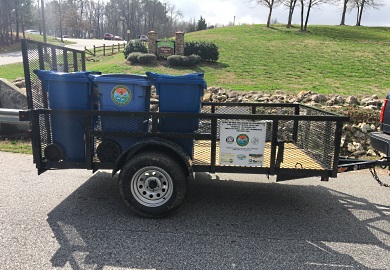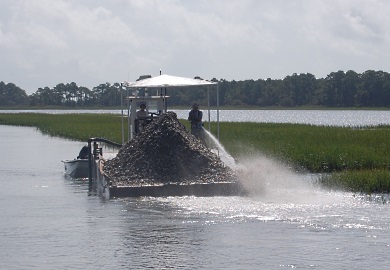DNR News** Archived Article - please check for current information. **
Oyster shell recycling expands to Upstate July 23, 2018

Volunteers in Greenville transport recycled oyster shells from the Shuckin Shack Oyster Bar to a quarantine location provided by Renewable Water Resources. (Photo: SCDNR)
For the first time, shellfish lovers in the Upstate will have an opportunity to give back to the resource they enjoy. Through the help of volunteers, South Carolina Department of Natural Resource (SCDNR) biologists have recently expanded their oyster shell recycling efforts to a restaurant in Greenville.
“Oysters are a staple in South Carolina cuisine and culture,” said SCDNR biologist Trent Austin. “They’re extremely important, regardless of whether you live three hours or three minutes from the coast. An estuary without oysters is an estuary without life.”
Oyster reefs provide important fish habitat, act as natural filters to keep waters clean, protect our shorelines against erosion and contribute a sustainable fishery to the coastal economy. Because young oysters prefer to settle and grow on other oysters, planting recycled shell on coastal shorelines is the best mechanism for encouraging new oyster reef growth.
Since 2000, SCDNR’s oyster shell recycling program has sought to do that through shell collection from restaurants and catering partners, as well as public drop-off sites. Recycled shell is then quarantined and used to plant and maintain South Carolina’s public shellfish grounds, from which anyone holding an up-to-date saltwater recreational fishing license can harvest oysters.
“We provide the drop-off locations, but to complete the cycle we really rely on private citizens to do their part,” Austin said.
Currently the program primarily collects shell along the coast, with a few locations in the Midlands. With staff based out of Charleston, establishing recycling sites in the Upstate has not been logistically possible. But a solution recently fell into place when Upstate Master Naturalist members volunteered to collect and transport the shell from the Shuckin Shack Oyster Bar, one of the largest oyster sellers in Greenville.
“The Upstate Master Naturalists, along with our other partners, have been essential in getting this new volunteer program up and running,” Austin said. “Without their volunteered time and efforts, our oyster shell recycling presence in Greenville would be nonexistent. Now, with more Greenville restaurants interested in contributing to the sustainability of this resource by recycling their shells, we’re looking for more volunteers to assist in the growth of the project.”
For years, South Carolina has had a critical shortage of the recycling oyster shell needed to maintain the state’s oyster reefs, with many shells going straight to landfills. SCDNR makes up that deficit by purchasing shell from out of state, a need that could be eliminated if SCDNR could recycle 20-25% of the shell available. Currently, SCDNR is only able to capture 10% of the shell available for recycling within the state.

SCDNR staff return recycled and quarantined oyster shells to the salt marsh to help rebuild oyster reefs. (Photo: SCDNR)
The Shuckin Shack Oyster Bar produces an estimated 750 bushels of oyster shells each year – approximately 2.5% of what SCDNR’s shell program recycled in 2017. Once a week, volunteers swap out full containers at the restaurant with empty ones. They then transport the shell to a Renewable Water Resources (ReWa) wastewater treatment facility, where staff have generously agreed to quarantine the shell until it’s safe to return to South Carolina waterways.
“ReWa’s vision of being a community partner as well as a leader in environmental stewardship makes participation in the recycling program an easy choice,” said Kevin James, director of Water Resource Recovery for the organization. “[We’re] proud to be one of the components in this very important program.”
If you’re interested in learning more about this volunteer opportunity, or are a restaurant/caterer interested in becoming a partner, please contact Trent Austin at austinm@dnr.sc.gov or 843-953-1367. Prospective volunteers should have experience towing a small trailer. SCDNR staff will provide all other training needed.
DNR Media Contacts
| Area | Personnel | Number |
|---|---|---|
| Coastal | David Lucas | 843-610-0096 |
| Marine | Erin Weeks | 843-953-9845 |
| Midlands | Kaley Nevin | 803-917-0398 |
| Upstate | Greg Lucas | 864-380-5201 |
After Hours Radio Room - 803-955-4000
